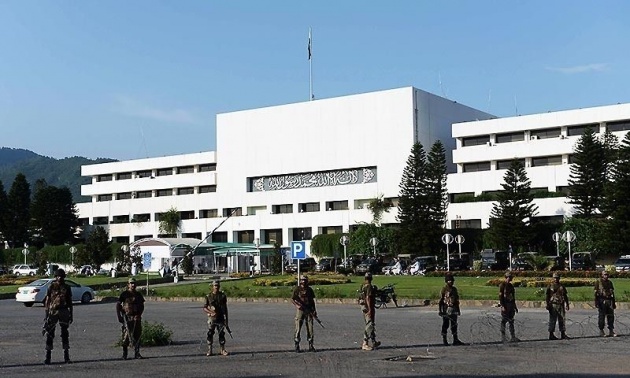|
In this photo, Rangers personnel stand guard outside Parliament. — AFP/File
|
Six weeks ago, Imran Khan and his Pakistan Tehreek-i-Insaf looked all fired up and on a winning streak. Suddenly, the December 16 tragedy happened in Peshawar and changed things for everyone everywhere.
The massacre of 150 schoolchildren and teachers by the Pakistani Taliban united the nation in the resolve to take on the insane militants. Political consultations and legislation moved fast.
Above all, for the first time, there appeared a political will on all sides to get the job done.
Alas, by the middle of January the rare consensus dissolved into the old, perpetual squabbling.
All mainstream political parties have since resumed their usual blame games. There is no debate on real issues. Only narratives have changed — more so by their spin doctors. Kaptan Imran Khan is back, though to a queered pitch, to lead the PTI in the latest power game — the election to 52 Senate seats held every three years. But the party would contest that election voting only in the assembly of Khyber Pakhtunkhwa, the province it rules, and not in the National Assembly because it was “born of rigged elections”.
That may look paradoxical only to those not in politics. Meanwhile, Prime Minister Nawaz Sharif, no more facing PTI’s jarring ‘Go Nawaz Go’ refrain, is busy in networking to gain the PML-N the control of the Senate too, the miserable performance of the ruling party in the National Assembly, where it enjoys absolute majority, notwithstanding.
Political analysts expect the PML-N to gain a majority in the Senate on the back of its allies and the PTI to return five Senators from its stronghold of Khyber Pakhtunkhwa. Although literally reduced to Sindh in May 2013 elections, the PPP is hopeful of receiving a much needed boost, if not many seats, in the Senate election to be held on March 3. It is pinning the hope on its seeming recovery in Punjab, the bastion of power as its founder Zulfikar Ali Bhutto called it. Perceived as invincible, until Gen. Ziaul Haq overthrew Bhutto in 1977, the PPP had some 50 MNAs from Punjab in its last stunt in power 2008-2013. It has only three MNAs from Punjab in the present National Assembly.
In background discussions, the PPP leaders of Punjab accept that PTI has emerged as a potent force in the largest province of the country.
But they are optimistic that come the next general elections and the PPP would “bounce back”. Well, the reasons they offer, to say the least, are yet to be tested.
For instance, a senior PPP office bearer argued that there are three long years before the country goes to polls. The onus will be on the PML-N to fulfill the tall promises it made to the voters to win the 2013 general elections, and the PTI to keep its popularity graph high.
It was the crippling power crisis that eroded the PPP clout in Punjab, he recalled. Now people expect better management of the power sector from the PML-N. It has talked a lot about mega plans but instead of any respite from blackouts, people have only seen the electricity tariff going up and up and up.
As for the PTI, did not its image take a knock when it abandoned its demand for the resignation of the Sharif brothers? Both continue to stall the party’s other demand that a judicial commission probe its charge of rigging in the 2013 elections, he noted.
And now has come its decision to become a part of the parliament by contesting the Senate election, but stay out of the National Assembly, where lies its real strength. To the PPP leader it reflected poorly on the thought process of the PTI leadership. “Many within the PTI are questioning the wisdom of the decision,” he said.
Top PPP leaders are seen flexing their muscles. This week, PPP opposition leader in the National Assembly, offered comparison, how their government, despite high international oil prices of $120 per barrel, taxed it lightly. Now, the reigning PML-N is taxing 50 per cent more when the international oil is selling for more than 50 per cent less.
Another PPP leader recalled how many thought that the party had “lost its touch” with the people when, in 1997, the PML-N won two-third majority. But five years later it staged a comeback in the 2002 general election, held by the military regime of Gen Pervez Musharraf, and again the next one in 2008.
Nadeem Afzal Chan, an adviser to the PPP Co-chairman, Asif Ali Zardari, told Dawn that the party is being reorganised in Punjab. “We successfully fought against the forces of the establishment in the past and will do so again and again,” he said.
“Three years down the road, the detractors of our party would rate the performance of the previous PPP government above that of the incumbent PML-N rulers,” said Mr Chan with great confidence. “Yes, the electricity crisis led to our defeat (in the 2013 election) but people see the very PML-N which undermined our Rental Power and LNG import projects pursuing them now.”
Generally, the PPP camp sees its chances in the PML-N and PTI fighting and it reaping the spoils. “We will stage a comeback when the time comes. We need not remind skeptics that our support base is still there,” said Mr Chan.



